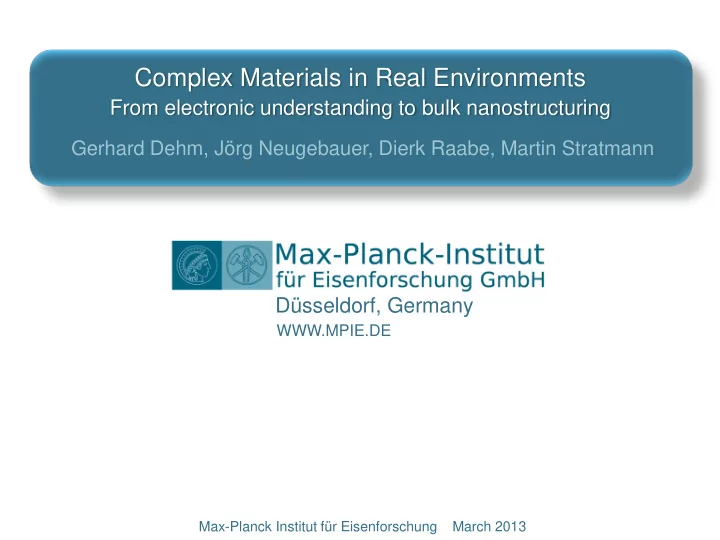

Complex Materials in Real Environments From electronic understanding to bulk nanostructuring Gerhard Dehm, Jörg Neugebauer, Dierk Raabe, Martin Stratmann Düsseldorf, Germany WWW.MPIE.DE Max-Planck Institut für Eisenforschung March 2013
Max-Planck Institut für Eisenforschung GmbH, Düsseldorf 1 Shareholders, Structure, History, Public-Private Partnership
Max-Planck Institut für Eisenforschung GmbH, Düsseldorf ...1998: Neumann – CEO, applications, transition 1999: Stratmann, Raabe – directors board, basic science, construction 2004: Neugebauer – ab-initio, broadening, construction 2007: Pyzalla – large infrastructures (left 2008 to HGF) 2012: Dehm – in-situ, construction (Dept. Raabe renamed) Community: MPG Vice-president; German Science Council; Chairman Governors Board RWTH; Fachkollegiat DFG, ESF Grants: Double ERC Advanced Grant, NanoMatFuture, ECCO2, Leibniz Award, AvH, 2 SFB Education: >50 PhDs (10 y), 4 Habilitations, 8 Professorships, Azubi Award, best Azubi education (IHK) Industry Outreach: > 1000 personell (20 y), > 500 projects with industry (10 y): hydrogen, alloy design (mobility, energy), kinetics, thermodynamics, simulation, microstructure, damage, cites corrosion, coatings, magnetic materials / ISI 2 Recent Devlopment, Construction, Scientific Direction, Output
Max-Planck Institut für Eisenforschung GmbH, Düsseldorf 3 Campus, Labs under Construction
MPIE: personnel 4 Team, Gender, Internationality
Scientific mission: complex materials in real environments • multiple elements, phases, defects • interacting mechanisms (non-linearity) nanoscale engineering • kinetic transients / local equilibrium • history dependent (synthesis, processing) • multiple scales (modeling, experiment) • real environments (systems science) 5 Scientific Mission: From Electrons to Complex Materials
Fields of competence for complex materials at the institute Martin Dierk Stratmann Raabe Complex Materials in Real Environments Gerhard Jörg Dehm Neugebauer 6 Scientific Mission: From Electrons to Complex Materials
MPIE structure and departments Shareholder: Max-Planck-Society MPG, German Steel Institute VDEh Scientific Board Trustees Board Strategy Board Scientific Board Gunther Eggeler Gerhard Dierk Martin Jörg Kai (Fellow) Dehm Raabe Stratmann Neugebauer de Weldige Mats Hillert (Extern. Member) Structure and Microstructure Interface Computational Administration Micro/Nano- Physics Chemistry Materials mechanics and Alloy and Design Reiner Kirchheim of Materials Design Surface (Extern. Member) Engineering 7 Governance, Structure, Shareholders
MPIE research focus: areas of high expertise Gerhard Jörg Dierk Martin Dehm Neugebauer Raabe Stratmann New Materials: Integrated Design, Synthesis Nanomechanics of Materials Interface Chemistry and Microstructure Physics Structure and Micro- / Surface Engineering and Alloy Design Materials Design Surfaces and Interfaces: Structure, Stability, Reactions Computational Microstructure – Property Correlations Multiscale Simulation and Characterization Materials: Energy, Transportation, Health, Manufacturing 8 Our strongest scientific fields
MPIE research focus: areas of high expertise Gerhard Jörg Dierk Martin Dehm Neugebauer Raabe Stratmann New Materials: Integrated Design, Synthesis Nanomechanics of Materials Interface Chemistry and Microstructure Physics Structure and Micro- / Surface Engineering and Alloy Design Materials Design Surfaces and Interfaces: Structure, Stability, Reactions Computational Microstructure – Property Correlations Multiscale Simulation and Characterization Materials: Energy, Transportation, Health, Manufacturing 9 Our strongest scientific fields
MPIE research focus: areas of high expertise Alloys lighter than water Gerhard Jörg Dierk Martin Dehm Neugebauer Raabe Stratmann New Materials: Integrated Design, Synthesis Nanomechanics of Materials H-charging effect Interface Chemistry and on TWIP steel Microstructure Physics Structure and Micro- / Surface Engineering and Alloy Design Materials Design Surfaces and Interfaces: Structure, Stability, Reactions Computational New turbine atom-specific corrosion of nanocrystalline magnets Microstructure – Property Correlations Multiscale Simulation and Characterization Materials: Energy, Transportation, Health, Manufacturing 10 Our strongest scientific fields
Answering societies' grand challenges with complex alloys 70% of all industrial innovations are associated with progress in materials science and engineering Complex Materials occupy key roles (energy, transportation, health, safety, infrastructure) Materials-related industries account for 46% of all EU manufacturing value and 11% of the EU’s total domestic product 3.5 billion € per day in the EU World Trade Organisation Our mission: Understanding and designing complex materials and mechanisms for real environments from first principles Link to Society: Complex Materials enable Innovative Manufacturing 11
MPIE network industry industry RUB MPIE RWTH DFG: From atoms to turbines (SFB 103); Steel - ab-initio (SFB 761) University Centers: CES - Center for Electrochemical Sciences; Cluster of Excellence RESOLV; AICES- Aachen Institute for Advanced Study; Graduate School Aachen Institute for Advanced Study in Computational Engineering Science; ICAMS - Simulation Center at RUB Max-Planck Initiatives: SURMAT Max-Planck Graduate School; Max-Planck Multiscale Modeling Initiative; 2 MPG-FhG groups (simulation, coatings) RUB: Ruhr University Bochum; RWTH: Aachen University; MMM: Max-Planck Multiscale Modeling Initiative; ICAMS: Inst. For Computational Materials Science at RUB; 12 SURMAT: Max-Planck Graduate School
IMPRS Surface and Interface Engineering in Advanced Materials International Max Planck Research School • Structured PhD programme (since 2004) • MPIs in Düsseldorf and Mülheim, Ruhr-Universität Bochum, ICAMS • Interdisciplinary: catalysis, corrosion, interfaces, thin films, alloy design • Evaluation spring 2014: application for 6 years extension Since 2004: • 84 students – 27 countries (1180 applicants) • 42 PhD – 7 with distinction • 193 peer reviewed papers 13 Max-Planck Graduate School: Serving Science and Industry
Suggestion from last board meeting; strengthen synthesis → lecture by Hauke Springer 14 Springer, Raabe: Acta Materialia 60 (2012) 4950
Rapid alloy prototyping: combinatorial design of complex alloys Combinatorial strip casting RAP: Steel-plant-in-a-box 45 states 135 samples 6 months 5 days Plasma-powder synthesis 15 Rapid screening of complex bulk alloys including tensile testing
The Düsseldorf Max-Planck Team 16 www.mpie.de
Recommend
More recommend